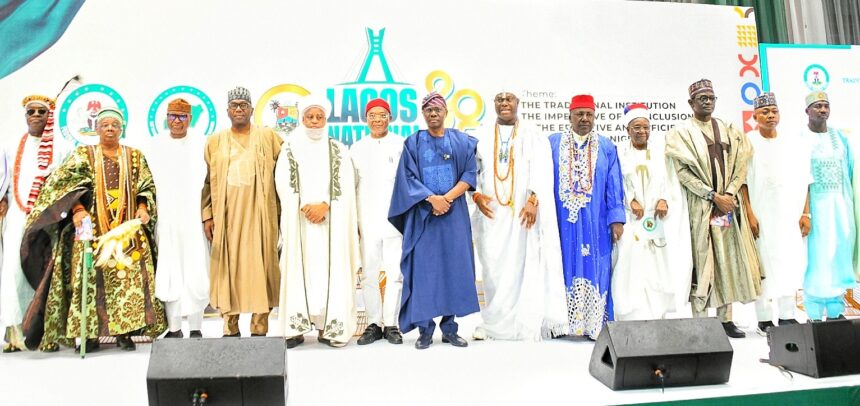Traditional rulers from across Nigeria converged in Lagos on Monday to deliberate on strengthening their roles in promoting peace, unity, and good governance in the country.
The two-day National Executive Committee meeting of the National Council of Traditional Rulers of Nigeria (NCTRN) was declared open by President Bola Ahmed Tinubu and hosted by Lagos State Governor, Babajide Sanwo-Olu, at the Lagos Continental Hotel, Victoria Island.
The event, themed “The Traditional Institution: The Imperative of its Inclusion in Effective and Efficient Governance in Nigeria,” brought together monarchs and state governors to discuss the place of traditional rulers in the nation’s governance structure.
Governor Sanwo-Olu, in his opening remarks, described traditional rulers as “vital links” between the government and the people, noting that their influence at the grassroots remains indispensable to peace and stability.
“Our traditional rulers are the bridge connecting the institutions of the state with community realities,” he said. “When traditional leaders are clearly woven into our governance framework, their authority can become a valuable asset for fostering peace, resolving conflicts, and driving community development.”
The governor lamented that the relevance of traditional institutions was eroded during the military era, but urged monarchs to continue to assert their influence and push for constitutional recognition.
Governor Hope Uzodimma of Imo State, representing President Tinubu and chair of the Progressive Governors Forum, said traditional rulers play critical roles in maintaining order and unity despite their lack of formal constitutional authority.
“We must stop pretending that the absence of a constitutional role means an absence of function,” Uzodimma said. “Your relevance is not in question. What is questionable is the failure of the system to give legal backing to a role it already depends on.”
The Sultan of Sokoto, Alhaji Muhammadu Sa’ad Abubakar III, and the Ooni of Ife, Oba Adeyeye Ogunwusi—both co-chairmen of NCTRN—stressed the need to strengthen unity and peace across ethnic divides.
The Sultan reaffirmed the council’s commitment to national unity, while the Ooni called for an end to the law placing first-class traditional rulers under local government chairmen, describing it as an affront to the dignity of traditional institutions.
Etsu Nupe, Alhaji Yahaya Abubakar, chairman of the meeting’s coordinating committee, said traditional institutions remain “the bedrock of national stability and moral guidance,” urging closer collaboration with government at all levels.
The meeting continues on Tuesday.

